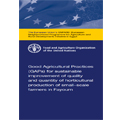In addition to the difficulties small holders face in obtaining fertilizers, the access to quality seeds is also limited. Most farmers purchase seeds from private suppliers who mix different qualities of seeds together to maximize their profit. Consequently, the resulting crops are mixed and inferior which has an adverse effect on the yield of each feddan planted.
Crop diversification is also generally lacking. Farmers tend to grow the crops they are traditionally used to plant. This could lead to decreased land fertility, increased risk of being attacked by pests, increased vulnerability to climatic changes, this is to name a few drawbacks. Also, there is lack of availability of agriculture machinery in the Agriculture Cooperatives which constitutes a major problem for small land holders as they must resort to privately owned machines that are rented by the hour at relatively high prices particularly for poor farmers. Those farmers who cannot afford to rent equipment must resort to manual methods and this adversely affects crop yields as well as the quantities of water used since land levelling is an important factor in efficient water management.
In view of the above, the “Scaling Up of Good Agricultural Practices in Fayoum” project will help small scale farmers to improve land and crop productivity in quality and quantity, increase their economic competitiveness and consequently enhance their living standards.
Objectives
The overall goal of this project is to improve the living condition of small-scale horticulture farmers in the five target villages in Fayoum governorate through increasing the competitiveness of their production and thus enhance the economic status of the rural poor especially small-scale horticultural growers through a participatory based development approach to promote the adoption of GAP related to the efficient use of land and water among the target beneficiaries.
Main Activities
- Small farmers’ associations (SFAs) established.
- Improved on-farm water management and water use efficiency technologies adopted.
- A study on land use, land cover and topography developed for the selection of suitable water harvesting measures.
- Sustainable soil fertility management practices adopted.
- Plastic greenhouse crop technology to produce improved seedlings and in-field integrated production and protection (IPP) of horticultural crops introduced to farmers.
- Crop diversification options introduced to farmers.
- Simple guidelines on Good Agricultural Practices (GAP) and business fact sheets for the principal horticultural crops grown developed.
Stakeholders
Small-scale farmers both men and women in the five designated villages. The action will specifically focus on approximately 1,000 farming households (200 per village) farming five feddans or less as they are often the most marginalised and constrained by poverty.





